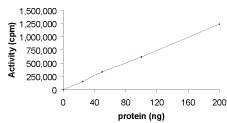
PKD2, Active(P76-10G)
FOR BULK ORDER REQUESTS PLEASE CONTACT US
Description :Recombinant full-length human PKD2 was expressed by baculovirus in Sf9 insect cells using a N-terminal GST tag.
Species :Human
Tag :GST tag
Expression System:Sf9 insect cells using baculovirus
Sequence :Full Length
Genbank Number :NM_016457
Specific Activity :Sample Kinase Activity Plot. For specific information on a given lot, see related technical data sheet.
Purity :Sample Purity Data. For specific information on a given lot, see related technical data sheet. 
Storage, Stability and Shipping :Store product at –70oC. For optimal storage, aliquot target into smaller quantities after centrifugation and store at recommended temperature. For most favorable performance, avoid repeated handling and multiple freeze/thaw cycles.
Applications :Kinase Assay, Western Blot
Molecular Weight :~130 kDa
Gene Aliases :HSPC187; DKFZp586E0820; PRKD2
Scientific Background :PKD2 is a novel phorbol ester- and growth factor-stimulated serine/threonine kinase that contains two cysteine-rich motifs at the N terminus, a pleckstrin homology domain, and a catalytic domain (1). It exhibits the strongest homology to the serine/threonine protein kinases PKD/PKCμ and PKCν. The PKD family of enzymes have been implicated in very diverse cellular functions, including Golgi organization and plasma membrane directed transport, metastasis, immune responses, apoptosis and cell proliferation (2).
References :
1. Sturany, S. et al: Molecular cloning and characterization of the human protein kinase D2. A novel member of the protein kinase D family of serine threonine kinases. J Biol Chem. 2001 Feb 2;276(5):3310-8.
2. Rykx, A. et al: Protein kinase D: a family affair. FEBS Lett. 2003 Jul 3;546(1):81-6.
Cited Publication :
1. LaValle et al. Novel protein kinase D inhibitors cause potent arrest in prostate cancer cell growth and motility. BMC Chemical Biology 2010, 10:5
Product Sheets (By Lot #) :
Research Areas :Neurobiology, Cardiovascular Disease, ERK/MAPK Pathway, NfkB Pathway, PKA/PKC Pathway, Apoptosis/Autophagy, Ser/Thr Kinases, Neurobiology, Cardiovascular Disease, ERK/MAPK Pathway, NfkB Pathway, PKA/PKC Pathway, Apoptosis/Autophagy, Ser/Thr Kinases
